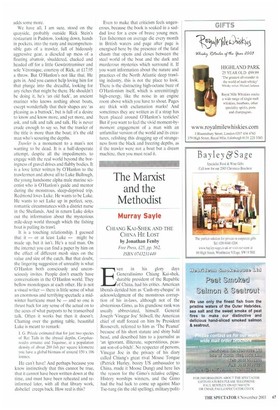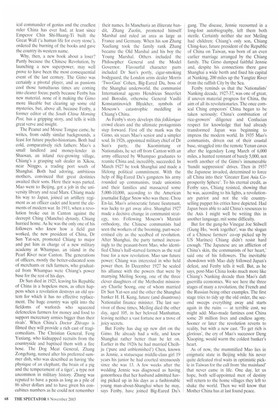The Marxist and the Methodist
Murray Sayle
CHIANG KAI-SHEK AND THE CHINA HE LOST by Jonathan Fenby Free Press, £25, pp. 562, ISBN 0743231449 Even in his glory days Generalissimo Chiang Kai-shek, durable president of the Republic of China, had his critics. American liberals derided him as 'Cash-my-cheque' in acknowledgment of the monstrous corruption of his in-laws, although not of the abstemious Gimo, as his grandiose rank was usually abbreviated, himself. General Joseph 'Vinegar Joe' Stilwell, the American chief of staff forced on him by President Roosevelt, referred to him as 'The Peanut' because of his short stature and shiny bald head, and described him to a journalist as 'an ignorant, illiterate, superstitious, peasant son-of-a-bitch'. No respecter of persons, Vinegar Joe in the privacy of his diary called Chiang's great rival Mouse Tongue (Patrick Hurley, boozy US ambassador to China, made it Moose Dung) and here lies the reason for the Gimo's relative eclipse. History worships winners, and the Gimo had the bad luck to come up against Mao Tse-tung (in the old spelling), military/polit
ical commander of genius and the cruellest ruler China has ever had, at least since Emperor Chin Shi-Huang-Ti built the Great Wall Ca human life for every stone'), ordered the burning of the books and gave the country its western name.
Why, then, a new book about a loser? Partly because the Chinese Revolution, by launching a new superpower, may well prove to have been the most consequential event of the last century. The Gimo was certainly a pivotal player, and as passions cool those tumultuous times are coming into clearer focus; partly because Fenby has new material, none of it making the Gimo more likeable but clearing up some old mysteries, but, above all, because Fenby, a former editor of the South China Morning Post, has a gripping story, and tells it with great verve and insight.
The Peanut and Mouse Tongue came, he writes, from oddly similar backgrounds, a feast for future psycho-historians. Both had cold, comparatively rich fathers: Mao's a small landlord and money-lender in Shaosan, an inland rice-growing village, Chiang's a grasping salt dealer in Xikou, near Ningpo, a trading port south of Shanghai. Both had adoring, ambitious mothers, convinced that great destinies awaited their sons. Here their ways parted. Mao went to Beijing, got a job in the university library and read Marx. Chiang made his way to Japan, joined an artillery regiment as an officer cadet and learnt the elements of modern war. In 1911, when a revolution broke out in Canton against the decrepit Ching (Manchu) dynasty, Chiang hurried home. As he was the only one of his followers who knew how a field gun worked, the new president of China, Dr Sun Yat-sen, promoted Chiang to major and put him in charge of a new military academy at Whampao, an island in the Pearl River near Canton. The generations of officers, mostly the better-educated sons of merchants or rich farmers, who graduated from Whampao were Chiang's power base for the rest of his days.
Dr Sun died in 1925, leaving his Republic of China in a hopeless mess, as often happens when a revolution destroys an old system for which it has no effective replacement. The huge country was split into the fiefdoms of warlords who squeezed defenceless farmers for money and food to support mercenary armies bigger than their rivals'. When China's Doctor Zhivago is filmed they will provide a rich cast of tragicomedians. The Christian General, Feng Yuxiang, who kidnapped recruits from the countryside and baptised them with a fire hose. The Dog Meat General, Zhang Zongchang, named after his preferred summer dish, who was described as having 'the physique of an elephant, the brain of a pig and the temperament of a tiger', a type not uncommon in military history. Zhang was reputed to have a penis as long as a pile of 86 silver dollars and to have given his concubines numbers as he could not remember their names. In Manchuria an illiterate bandit, Zhang Zuolin, promoted himself Marshal and ruled an area as large as France and Germany. When his son Zhang Xueliang took the family rank Zhang became the Old Marshal and his boy the Young Marshal. Others included the Philosopher General and the Model Governor. Flavourful character parts included Dr Sun's portly, cigar-smoking bodyguard, the London arms dealer Morris `Two-Gun' Cohen, Big-Eared Du, boss of the Shanghai underworld, the communist International agents Hendricus Sneevliet and Borodin, otherwise General Vasilii Konstantinovich Blyukher, symbols of Moscow's catastrophic meddling in Chiang's China.
As Fenby's story develops this folklorique crowd clears and the ultimate protagonists step forward. First off the mark was the Gimo, six years Mao's senior and a simpler soul. In 1926, appointed military chief of Dr Sun's party, the Kuomintang or Nationalists, he set off from Canton with an army officered by Whampao graduates to reunite China and, incredibly, succeeded. In March 1927 he took Shanghai and made a lifelong political commitment. With the help of Big-Eared Du's gangsters his army rounded up communists, trade unionists and their families and massacred some 5,000-10,000, according to the American journalist Edgar Snow who was there. Chou En-lai, Mao's aristocratic future lieutenant, was lucky to get away alive. Shanghai 1927 made a decisive change in communist strategy, too. Following Moscow's Marxist orthodoxy, the Chinese communists had seen the workers of the booming, part-westernised city as the seedbed of revolution. After Shanghai, the party turned increasingly to the peasant-born Mao, who identified China's half-starved farmers as the real base for a new revolution. Mao saw future power: Chiang was interested in who held power then. In December 1927 he sealed his alliance with the powers that were by marrying Meiling Soong, one of the three clever daughters of the Methodist missionary Charlie Soong, one of whom married Dr Sun Yat-sen and the other the Shanghai banker H. H. Kung, future (and disastrous) Nationalist finance minister. The last survivor of those times, Meiling died the other day, aged 105, in her beloved Manhattan, leaving neither a vast fortune nor a trove of juicy secrets.
But Fenby has dug up new dirt on the Gimo. He already had a wife, and knew Shanghai rather better than he let on. Earlier in the 1920s he had married Cheihju (pure and unblemished') Chen, known as Jennie, a statuesque middle-class girl 19 years his junior he had courted strenuously since she was 13. A few weeks after the wedding Jennie was diagnosed as having gonorrhoea that her husband admitted having picked up in his days as a fashionable young man-about-Shanghai when he may, says Fenby, have joined Big-Eared Du's gang. The disease, Jennie recounted in a long-lost autobiography, left them both sterile. Certainly neither she nor Meiling had children; Chiang's only son, Chiang Ching-kuo, future president of the Republic of China on Taiwan, was born of an even earlier marriage arranged by the Chiang family. The Gimo dumped faithful Jennie and, despite his connections there gave Shanghai a wide berth and fixed his capital at Nanking, 200 miles up the Yangtze River from the raffish City by the Sea.
Fenby reminds us that the Nationalists' Nanking decade, 1927-37, was one of great, if uneven material progress for China, the aim of all its revolutionaries. The once comical Ching emperors' China began to be taken seriously; China's combination of rice-growers' diligence and Confucian respect for knowledge that had already transformed Japan was beginning to impress the modern world. In 1935 Mao's communists, driven out of their coastal base, straggled into the remote Yenan caves after the legendary Long March of 6,000 miles, a hunted remnant of barely 5,000, not worth another of the Gimo's innumerable 'bandit suppression' drives. Then in 1937 the Japanese invaded, determined to force all China into their 'Greater East Asia Coprosperity Sphere'. To his eternal credit, as Fenby says, Chiang resisted, showing that he was, according to his lights, a revolutionary patriot and not the vile countryselling puppet his critics have depicted. Had Japan been able to add China's resources to the Axis I might well be writing this in another language, mit some difficulty.
But for the gung-ho Vinegar Joe Stilwell (Gung Ho, 'work together', was the slogan of a Chinese farmers' co-op picked up by US Marines) Chiang didn't resist hard enough. 'The Japanese are an affliction of China's skin, the communists of her heart,' said one of his followers. The inevitable showdown with Mao duly followed Japan's defeat, and Fenby tells it well. But, as he says, post-Mao China looks much more like Chiang's Nanking decade than Mao's daft guerrilla economics. We see here the three stages of many a revolution, the French and the Russian being other examples. The first stage tries to tidy up the old order, the second sweeps everything away and starts again in the ruins — at terrible cost, we might add: Mao-made famines cost China some 20 million lives and endless agony. Sooner or later the revolution reverts to reality, but with a new cast. 'To get rich is glorious', the cry of Mao's successor Deng Xiaoping, would warm the coldest banker's heart.
As of now, the mummified Mao lies in enigmatic state in Beijing while his never quite defeated rival waits in optimistic pickle in Taiwan for the call from 'the mainland' that never came in life. One day, let us hope, both self-appointed men of destiny will return to the home villages they left to shake the world. Then we will know that Mother China has at last found peace.



































































































 Previous page
Previous page